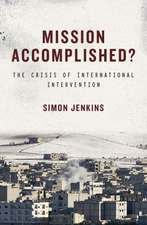Memory and Power in Post-War Europe: Studies in the Presence of the Past
Editat de Jan-Werner Mülleren Limba Engleză Paperback – 28 aug 2002
| Toate formatele și edițiile | Preț | Express |
|---|---|---|
| Paperback (1) | 307.83 lei 6-8 săpt. | |
| Cambridge University Press – 28 aug 2002 | 307.83 lei 6-8 săpt. | |
| Hardback (1) | 721.85 lei 6-8 săpt. | |
| Cambridge University Press – 28 aug 2002 | 721.85 lei 6-8 săpt. |
Preț: 307.83 lei
Nou
Puncte Express: 462
Preț estimativ în valută:
58.90€ • 61.66$ • 48.74£
58.90€ • 61.66$ • 48.74£
Carte tipărită la comandă
Livrare economică 05-19 aprilie
Preluare comenzi: 021 569.72.76
Specificații
ISBN-13: 9780521000703
ISBN-10: 052100070X
Pagini: 302
Ilustrații: black & white illustrations
Dimensiuni: 152 x 227 x 24 mm
Greutate: 0.48 kg
Ediția:New.
Editura: Cambridge University Press
Colecția Cambridge University Press
Locul publicării:Cambridge, United Kingdom
ISBN-10: 052100070X
Pagini: 302
Ilustrații: black & white illustrations
Dimensiuni: 152 x 227 x 24 mm
Greutate: 0.48 kg
Ediția:New.
Editura: Cambridge University Press
Colecția Cambridge University Press
Locul publicării:Cambridge, United Kingdom
Cuprins
Introduction: The power of memory, the memory of power and the power over memory Jan-Werner Müller; Part I. Myth, Memory and Analogy in Foreign Policy: 1. Memory of sovereignty and sovereignty over memory; Poland, Lithuania and Ukraine since 1939 Tim Snyder; 2. Myth, memory and policy in France since 1945 Robert Gildea; 3. The power of memory and memories of power: the cultural parameters of German foreign policy making since 1945 Thomas U. Berger; 4. The past in the present: British Imperial memories and the European Question Anne Deighton; 5. Memory, the media and NATO: information intervention in Bosnia-Hercegovina Monroe E. Price; 6. Europe's post-Cold War memory of Russia Iver B. Neumann; Part II. Memory, Power and Justice in Domestic Affairs: 7. The past is another country: myth and memory in postwar Europe Tony Judt; 8. The emergence and legacies of divided memory: Germany and the Holocaust after 1945 Jeffrey Herf; 9. Unimagined communities: the power of memory and the conflict in the former Yugoslavia Ilana R. Bet-El; 10. Translating memories of war and co-belligerency into Cold War politics: the Italian case Ilaria Poggiolini; 11. Institutionalizing the past: shifting memories of nationhood in German education and immigration policies Daniel Levy and Julian Dierkes; 12. Trials, purges or history lessons: treating a difficult past in post-communist Europe Timothy Garton Ash.
Recenzii
'What makes the book attractive is breadth and depth of empirical study. Miller's volume is a rich collection of studies in the political uses of the past in postwar Europe.' International Affairs
'This is a timely intervention in the burgeoning fields of investigations that engage with the failures and horrors of the past century and the resuscitation of myths and growing important of memories that come along with them in the present … its innovative approach lies in the informed use of theoretical conceptions for the historical and empirical analysis of concrete political phenomena and processes of legitimation in Western, Central and Eastern Europe … the book very carefully avoid the methodological shortcomings and over-psychologising that is prevalent in much of so-called 'memory studies'. It provides a well-researched, empirically rich account of the political importance of memory and its consequences for current policy-making.' Political Studies Review
'This is a timely intervention in the burgeoning fields of investigations that engage with the failures and horrors of the past century and the resuscitation of myths and growing important of memories that come along with them in the present … its innovative approach lies in the informed use of theoretical conceptions for the historical and empirical analysis of concrete political phenomena and processes of legitimation in Western, Central and Eastern Europe … the book very carefully avoid the methodological shortcomings and over-psychologising that is prevalent in much of so-called 'memory studies'. It provides a well-researched, empirically rich account of the political importance of memory and its consequences for current policy-making.' Political Studies Review
Descriere
This book is the first to examine the connection between memory and politics directly.














